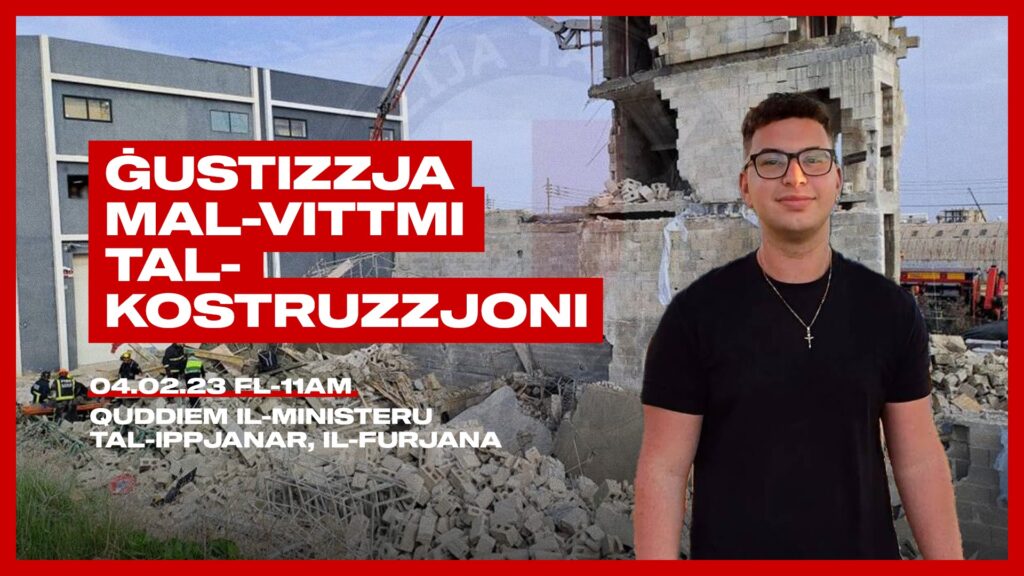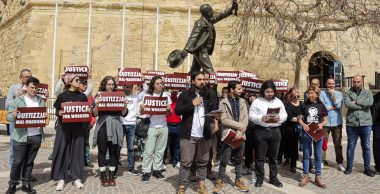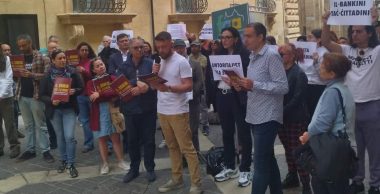Greed continues to rule the construction industry
Exactly two months ago, the lifeless body of 20-year old Jean Paul Sofia was found under the rubble of a collapsed building in Corradino. Five other workers where seriously injured in the incident, three of them critically. Only three years ago, on the 2 March 2020, Miriam Pace was killed in her home after the whole building collapsed as a result of construction works on an adjacent site.
The workplace death of construction workers has also become a monthly occurrence and thousands are injured on construction sites every year.
These are not tragic accidents but the inevitable consequence of a rotten system designed to satisfy the insatiable hunger for profit of developers and other businesses in the construction sector. The deaths of Jean Paul Sofia, Miriam Pace, and of all construction workers who perished at their workplace, were preventable. Their lives have been sacrificed at the altar of greed.
Whilst noting with disappointment that no one has been yet charged in connection with Jean Paul Sofia’s death, we underline that real justice for all the victims of the construction industry will only be served when the systemic factors that have allowed this rot to fester are addressed. To this end, we support calls for a public inquiry into the death of Jean Paul Sofia since this will go beyond identifying individual responsibility and uncover systemic failures.
Over the past decade, the authorities have green-lighted a building spree in a context that lacks the very basic regulation and enforcement framework protecting workers and residents. Following a spate of building collapses in 2019, and the death of Miriam Pace in 2020, Government had promised a series of reforms in the sector.
Tragically, the reform promised in the wake of Miriam Pace’s death has failed to materialize beyond a few cosmetic changes. We can easily identify four glaring examples of this failure:
1. The licensing of contractors, bitterly opposed from behind the scenes by the developers, has not come into force. An effective licensing system would ensure that operators involved in the construction sector are trustworthy and adequately trained and, most importantly, establish a mechanism by which licenses can be revoked when operators engage in malpractices. This legal framework and mechanism are nowhere to be seen as yet. The developers have so far vetoed its introduction and implementation.
2. There are still no Building and Construction Codes. Incredible but true: there are currently no laws that regulate basic aspects of the construction process such as what construction machinery and material can be used, where and how.
3. The Building and Construction Authority (BCA) established two years ago has become another dysfunctional authority seized by developers’ interests; the type of authorities we have become accustomed to in the environment and planning sector. The Chair of the BCA Board, Maria Schembri Grima, is one of the main architects of some of Malta’s most ruthless developers, such as Joseph Portelli and Michael Stivala, and the rest of the Board is composed of political appointees. The BCA has very little to show for its work. The reforms it should have been spearheading have stalled and enforcement in the construction industry remains far from sufficient.
4. The wider planning and construction regime has not seen any sign of reforms. Suffice it to say that the four-storey building which collapsed in Corradino had been given the go-ahead by means of two Development Notification Orders (DNOs). DNOs allow applicants to bypass the planning system and build entire structures on the strength of a mere notification, without any serious evaluation of the building project.
The failure to reform the deadly construction industry lies in the power of developers to veto any serious measure that can safeguard the people’s safety and quality of life. It is truly shameful and worrying that Government is willing to accede to this lobby’s demands instead of protecting the workers and residents in Malta and Gozo.
This has to change. We cannot continue sacrificing people’s lives and our quality of life for the quick profits of the few. Justice must be served to the victims of the construction industry and to the people of Malta and Gozo. The sector has to be reformed now.
_______
Stqarrija għall-Istampa 04.02.23
Il-ġustizzja għall-vittmi tal-industrija tal-kostruzzjoni tista’ tasal biss b’riforma fis-settur
Ir-regħba tkompli ssaltan fl-industrija tal-kostruzzjoni
Xahrejn ilu nstab il-katavru ta’ Jean Paul Sofia ta’ 20 sena taħt it-tifrik ta’ bini mġarraf f’Kordin. Weġġgħu serjament ħames ħaddiema oħra f’dak l-inċident, tlieta minnhom b’mod kritiku. Tliet snin ilu biss, fit-2 ta’ Marzu 2020, Miriam Pace nqatlet fid-dar tagħha wara li l-bini li kienet tgħix fih iġġarraf b’riżultat ta’ xogħlijiet ta’ kostruzzjoni f’sit biswit.
Il-mewt tal-ħaddiema tal-kostruzzjoni fuq il-post tax-xogħol saret ħaġa ta’ kull xahar filwaqt li kull sena jweġġgħu eluf fis-siti tal-kostruzzjoni.
Dawn mhumiex inċidenti traġiċi iżda konsegwenza inevitabbli ta’ sistema maħsuba biss biex taqta’ l-ġuħ għall-profitt li għandhom l-iżviluppaturi u n-negozji fis-settur tal-kostruzzjoni, ġuħ li ma taqtgħu b’xejn. L-imwiet ta’ Jean Paul Sofia, Miriam Pace, u tal-ħaddiema kollha tal-kostruzzjoni li mietu fuq il-post tax-xogħol tagħhom, setgħu jiġu evitati. Ħajjithom ġiet sagrifikata fuq l-artal tar-regħba.
Filwaqt li ninnutaw b’diżappunt kbir li għadu ma tressaq ħadd b’rabta mal-mewt ta’ Jean Paul Sofia, nisħqu li l-ġustizzja ta’ veru għall-vittmi kollha tal-industrija tal-kostruzzjoni ser tasal biss meta jiġu indirizzati l-fatturi sistemiċi li wasslu għal dawn l-imwiet. Għalhekk nappoġġaw is-sejħiet li saru għal inkjesta pubblika dwar il-mewt ta’ Jean Paul Sofia sabiex insiru nafu min huwa responsabbli u biex joħorġu fil-beraħ ukoll il-fallimenti sistemiċi tas-sistema mnawwra li għandna bħalissa.
Tul l-aħħar għaxar snin li għaddew, l-awtoritajiet ippermettew maratona fuq oħra ta’ bini f’kuntest nieqes mill-iktar regolamentazzjoni bażika u qafas ta’ infurzar li jħares lill-ħaddiema u lir-residenti. Wara l-kollass ta’ binja wara oħra fl-2019 u l-mewt ta’ Miriam Pace fl-2020, il-gvern wiegħed serje ta’ riformi fis-settur.
Traġikament, ir-riforma mwiegħda wara l-mewt ta’ Miriam Pace irriżultat biss f’tibdil kożmetiku ħafif. Nistgħu faċilment nidentifikaw erba‘ eżempji ċari ta’ dan in-nuqqas:
1. Il-liċenzjar tal-kuntratturi, li l-iżviluppaturi opponew bis-saħħa minn wara l-kwinti baqa’ ma daħalx fis-seħħ. Sistema ta’ liċenzjar effettiva tiżgura li l-operaturi involuti fis-settur tal-kostruzzjoni huma professjonali u mħarrġa b’mod adegwat u tistabbilixxi mekkaniżmu li permezz tiegħu l-liċenzji jistgħu jiġu revokati hekk kif l-operaturi jħaddnu prattiki ħżiena. Dan il-qafas legali u l-mekkaniżmu li jmur miegħu ma jeżistux u l-iżviluppaturi għadhom qegħdin jopponu l-introduzzjoni u l-implimentazzjoni tagħhom.
2. Ma jeżistux Kodiċi tal-Bini u l-Kostruzzjoni. Inkredibbli iżda vera: attwalment ma hemm l-ebda liġijiet li jirregolaw aspetti bażiċi tal-proċess tal-kostruzzjoni bħal liema makkinarju u materjal tal-kostruzzjoni jistgħu jintużaw, fejn u kif.
3. L-Awtorità tal-Bini u l-Kostruzzjoni li twaqqfet sentejn ilu malajr saret awtorità oħra li ma tiffunzjonax għaliex inħatfet mill-interessi tal-iżviluppaturi u saret waħda mill-awtoritajiet l-oħra li issa drajna bihom fis-settur tal-ambjent u l-ippjanar. Iċ-Chairperson tal-Bord tal-Awtorità tal-Bini u l-Kostruzzjoni, Maria Schembri Grima, hija waħda mill-periti ewlenin tal-aktar żviluppaturi bla ħniena ta’ Malta, bħal Joseph Portelli u Michael Stivala, u l-kumplament tal-Bord huwa magħmul minn persuni maħtura mill-politiċi. L-Awtorità tal-Bini u l-Kostruzzjoni ftit li xejn għandha x’turi għall-ħidma tagħha. Ir-riformi li kellha tmexxi waqfu u l-infurzar fl-industrija tal-kostruzzjoni għadu ‘l bogħod milli jkun biżżejjed.
4. Ir-reġim usa’ ta’ ppjanar u kostruzzjoni ma ra l-ebda sinjal ta’ riformi. Biżżejjed ngħidu li l-bini ta’ erba’ sulari li waqa’ f’Kordin kien ingħata l-approvazzjoni permezz ta’ żewġ Development Notification Orders (DNOs). Id-DNOs jippermettu lill-applikanti jevitaw is-sistema tal-ippjanar u jibnu strutturi sħaħ bis-saħħa ta’ sempliċi notifika, mingħajr ebda evalwazzjoni serja tal-proġett tal-bini.
In-nuqqas ta’ riforma fl-industrija tal-kostruzzjoni ġej mis-setgħa li għandhom l-iżviluppaturi li jitfgħu veto fuq kwalunkwe miżura serja li tista’ tħares is-sikurezza u l-kwalità tal-ħajja tan-nies. Tassew tal-mistħija u ta’ tħassib kbir kif il-gvern lest li jilqa’ t-talbiet ta’ dan il-lobby minflok jipproteġi lill-ħaddiema u r-residenti f’Malta u Għawdex.
Dan irid jinbidel. Ma nistgħux inkomplu nissagrifikaw il-ħajja tan-nies u l-kwalità tal-ħajja tagħna għall-profitti malajr tal-ftit. Trid issir ġustizzja mal-vittmi tal-industrija tal-kostruzzjoni u mal-poplu ta’ Malta u Għawdex. Is-settur jeħtieġ riforma issa.




